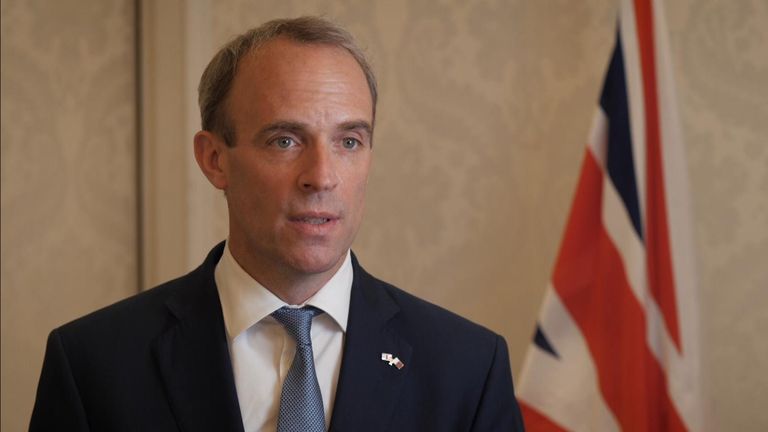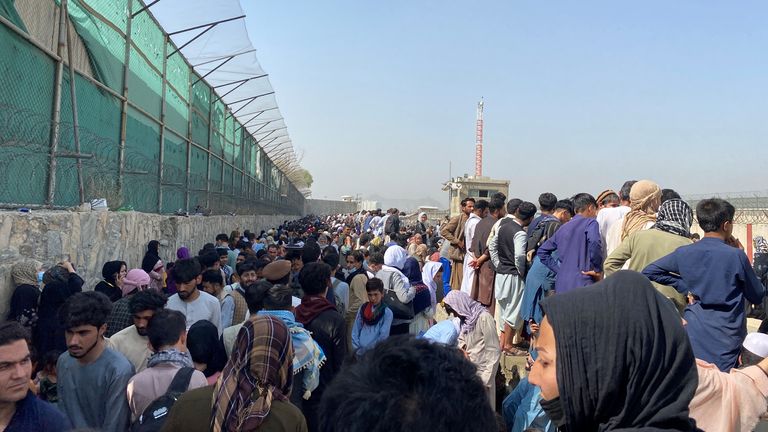Damning claims from a whistleblower about failures during Britain’s evacuation from Afghanistan will be presented to MPs today.
The government is accused of being unprepared for a huge number of cries for help from Afghans at risk because of their links with the UK.
Some of those Afghans have since been murdered, it is alleged.
The foreign secretary at the time, Dominic Raab, is accused of responding too slowly and inadequately to the crisis.
The claims will be made in written evidence by a desk officer at the Foreign Office, Raphael Marshall.
Speaking before the hearing, chair of the foreign affairs select committee, Tom Tugendhat, said that the allegations undermined government claims about the period.
“The evacuation has been described as a success by some, but these allegations point to a very different story – one of lack of interest, and bureaucracy over humanity,” he said.
Mr Marshall claims that at the height of the evacuation effort, for one afternoon, he was “the only person monitoring and processing emails in the Afghan Special Cases inbox”.
The special cases included Afghan soldiers, politicians, journalists, civil servants, activists, aid workers, and judges, who did not work directly for the British but were vulnerable because of their links to UK forces.
In the evidence, Mr Marshall estimates “between 75,000 and 150,000 people (including dependants) applied for evacuation” to the Afghan Special Cases team and that “fewer than 5% of these people have received any assistance”.
In the written evidence he states: “It is clear that some of those left behind have since been murdered by the Taliban.”
Team had a woeful lack of knowledge of Afghanistan
The team handling the cases had a woeful lack of knowledge of Afghanistan, the evidence will claim.
None of its members had “studied Afghanistan, worked on Afghanistan previously, or had a detailed knowledge of Afghanistan”.
And yet junior officials were “being asked to make hundreds of life and death decisions about which they knew nothing”, according to the evidence.
Mr Marshall alleges that it took “several hours for the foreign secretary to engage with notes about exceptional cases of people urgently needing evacuation”.
Instead Mr Raab is alleged to have said he needed “all the cases set out in a well-presented table to make decisions”.
Emails from desperate people were given a cursory reading but their details were not recorded, it is claimed.
“We never returned to these emails due to lack of time,” Mr Marshall said. “They were therefore de facto eliminated from the evacuation process.”
For one week “emails were processed by marking them with a flag once read but were not entered into a spreadsheet”.
The whistleblower claims that “the purpose of this system was to allow the prime minister and the then foreign secretary to inform MPs that there were no unread emails”.
Military working with one computer shared between eight people
The military were drafted in to the Foreign Office to help process the pleas for evacuation.
But they were working with one computer shared between eight people, it is claimed, and were not experienced in the software being used.
The allegations add to claims the evacuation was handled inadequately and dysfunctionally by a government department woefully understaffed for the challenge, with many senior figures on holiday.
Sir Philip Barton, permanent undersecretary to the foreign office, and Sir Lawrie Bristow, former ambassador to Afghanistan, can expect to be questioned about the evidence when they meet MPs later.
A government spokesperson defended its record on the evacuation .
“UK government staff worked tirelessly to evacuate more than 15,000 people from Afghanistan within a fortnight.
“This was the biggest mission of its kind in generations and the second largest evacuation carried out by any country. We are still working to help others leave.
“More than 1,000 FCDO staff worked to help British nationals and eligible Afghans leave during Op Pitting. The scale of the evacuation and the challenging circumstances meant decisions on prioritisation had to be made quickly to ensure we could help as many people as possible.
“Regrettably we were not able to evacuate all those we wanted to, but our commitment to them is enduring, and since the end of the operation we have helped more than 3,000 individuals leave Afghanistan.”








